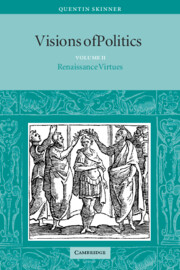Book contents
- Frontmatter
- Contents
- List of plates
- General preface
- Full contents: Volumes 1–3
- Acknowledgements
- Conventions
- 1 Introduction: The reality of the Renaissance
- 2 The rediscovery of republican values
- 3 Ambrogio Lorenzetti and the portrayal of virtuous government
- 4 Ambrogio Lorenzetti on the power and glory of republics
- 5 Republican virtues in an age of princes
- 6 Machiavelli on virtù and the maintenance of liberty
- 7 The idea of negative liberty: Machiavellian and modern perspectives
- 8 Thomas More's Utopia and the virtue of true nobility
- 9 Humanism, scholasticism and popular sovereignty
- 10 Moral ambiguity and the Renaissance art of eloquence
- 11 John Milton and the politics of slavery
- 12 Classical liberty, Renaissance translation and the English civil war
- 13 Augustan party politics and Renaissance constitutional thought
- 14 From the state of princes to the person of the state
- Bibliographies
- Index
- Plate section
11 - John Milton and the politics of slavery
Published online by Cambridge University Press: 05 September 2012
- Frontmatter
- Contents
- List of plates
- General preface
- Full contents: Volumes 1–3
- Acknowledgements
- Conventions
- 1 Introduction: The reality of the Renaissance
- 2 The rediscovery of republican values
- 3 Ambrogio Lorenzetti and the portrayal of virtuous government
- 4 Ambrogio Lorenzetti on the power and glory of republics
- 5 Republican virtues in an age of princes
- 6 Machiavelli on virtù and the maintenance of liberty
- 7 The idea of negative liberty: Machiavellian and modern perspectives
- 8 Thomas More's Utopia and the virtue of true nobility
- 9 Humanism, scholasticism and popular sovereignty
- 10 Moral ambiguity and the Renaissance art of eloquence
- 11 John Milton and the politics of slavery
- 12 Classical liberty, Renaissance translation and the English civil war
- 13 Augustan party politics and Renaissance constitutional thought
- 14 From the state of princes to the person of the state
- Bibliographies
- Index
- Plate section
Summary
King Charles I was executed on 30 January 1649, and on 17 March the Rump Parliament took the still more revolutionary step of abolishing the office of kingship, arguing that ‘for the most part, use hath been made of the regal power to oppress and impoverish and enslave the subject’. Two days later, by a further Act of Parliament, the House of Lords was declared ‘useless and dangerous’ and was likewise ‘wholly abolished’. After pausing anxiously for two months, Parliament went on to draw the obvious inference and duly proclaimed that ‘the people of England, and of all the dominions and territories thereunto belonging’ now constituted ‘a Commonwealth and Free State’ governed solely by the people's elected representatives. With this sequence of decisions, a republic was founded for the first and (so far) the only time in British history.
These unprecedented events stood in urgent need of legitimation, and several different strands of political thinking were immediately pressed into service. Some defenders of the commonwealth, including the Rump itself, sought to occupy the highest possible constitutional ground. They argued that Charles I had broken his contract with his people, and that the people's representatives had simply removed a tyrant and reestablished lawful authority under their own command. Others argued, more concessively, that all governments are manifestations of the will of God, and thus that the new regime, no less than its predecessor, ought to be regarded as providentially ordained.
- Type
- Chapter
- Information
- Visions of Politics , pp. 286 - 307Publisher: Cambridge University PressPrint publication year: 2002
- 6
- Cited by

